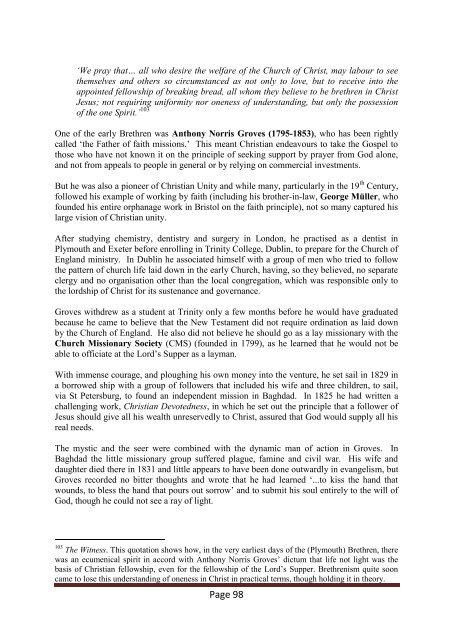Digging Out the Embedded Church - The Maranatha Community
Digging Out the Embedded Church - The Maranatha Community
Digging Out the Embedded Church - The Maranatha Community
You also want an ePaper? Increase the reach of your titles
YUMPU automatically turns print PDFs into web optimized ePapers that Google loves.
„We pray that… all who desire <strong>the</strong> welfare of <strong>the</strong> <strong>Church</strong> of Christ, may labour to see<br />
<strong>the</strong>mselves and o<strong>the</strong>rs so circumstanced as not only to love, but to receive into <strong>the</strong><br />
appointed fellowship of breaking bread, all whom <strong>the</strong>y believe to be brethren in Christ<br />
Jesus; not requiring uniformity nor oneness of understanding, but only <strong>the</strong> possession<br />
of <strong>the</strong> one Spirit.‟ 103<br />
One of <strong>the</strong> early Brethren was Anthony Norris Groves (1795-1853), who has been rightly<br />
called „<strong>the</strong> Fa<strong>the</strong>r of faith missions.‟ This meant Christian endeavours to take <strong>the</strong> Gospel to<br />
those who have not known it on <strong>the</strong> principle of seeking support by prayer from God alone,<br />
and not from appeals to people in general or by relying on commercial investments.<br />
But he was also a pioneer of Christian Unity and while many, particularly in <strong>the</strong> 19 th Century,<br />
followed his example of working by faith (including his bro<strong>the</strong>r-in-law, George Müller, who<br />
founded his entire orphanage work in Bristol on <strong>the</strong> faith principle), not so many captured his<br />
large vision of Christian unity.<br />
After studying chemistry, dentistry and surgery in London, he practised as a dentist in<br />
Plymouth and Exeter before enrolling in Trinity College, Dublin, to prepare for <strong>the</strong> <strong>Church</strong> of<br />
England ministry. In Dublin he associated himself with a group of men who tried to follow<br />
<strong>the</strong> pattern of church life laid down in <strong>the</strong> early <strong>Church</strong>, having, so <strong>the</strong>y believed, no separate<br />
clergy and no organisation o<strong>the</strong>r than <strong>the</strong> local congregation, which was responsible only to<br />
<strong>the</strong> lordship of Christ for its sustenance and governance.<br />
Groves withdrew as a student at Trinity only a few months before he would have graduated<br />
because he came to believe that <strong>the</strong> New Testament did not require ordination as laid down<br />
by <strong>the</strong> <strong>Church</strong> of England. He also did not believe he should go as a lay missionary with <strong>the</strong><br />
<strong>Church</strong> Missionary Society (CMS) (founded in 1799), as he learned that he would not be<br />
able to officiate at <strong>the</strong> Lord‟s Supper as a layman.<br />
With immense courage, and ploughing his own money into <strong>the</strong> venture, he set sail in 1829 in<br />
a borrowed ship with a group of followers that included his wife and three children, to sail,<br />
via St Petersburg, to found an independent mission in Baghdad. In 1825 he had written a<br />
challenging work, Christian Devotedness, in which he set out <strong>the</strong> principle that a follower of<br />
Jesus should give all his wealth unreservedly to Christ, assured that God would supply all his<br />
real needs.<br />
<strong>The</strong> mystic and <strong>the</strong> seer were combined with <strong>the</strong> dynamic man of action in Groves. In<br />
Baghdad <strong>the</strong> little missionary group suffered plague, famine and civil war. His wife and<br />
daughter died <strong>the</strong>re in 1831 and little appears to have been done outwardly in evangelism, but<br />
Groves recorded no bitter thoughts and wrote that he had learned „...to kiss <strong>the</strong> hand that<br />
wounds, to bless <strong>the</strong> hand that pours out sorrow‟ and to submit his soul entirely to <strong>the</strong> will of<br />
God, though he could not see a ray of light.<br />
103 <strong>The</strong> Witness. This quotation shows how, in <strong>the</strong> very earliest days of <strong>the</strong> (Plymouth) Brethren, <strong>the</strong>re<br />
was an ecumenical spirit in accord with Anthony Norris Groves‟ dictum that life not light was <strong>the</strong><br />
basis of Christian fellowship, even for <strong>the</strong> fellowship of <strong>the</strong> Lord‟s Supper. Brethrenism quite soon<br />
came to lose this understanding of oneness in Christ in practical terms, though holding it in <strong>the</strong>ory.<br />
Page 98








